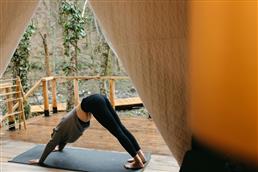
In a world that never logs off, more people are reaching their limits. Between Zoom calls, Slack pings, algorithm-driven newsfeeds, and endless doomscrolling, the average adult now spends more than 11 hours a day interacting with digital media. This hyperconnected lifestyle, once celebrated as the pinnacle of convenience and productivity, is increasingly leading to exhaustion—not just mental, but emotional and even physical.
Enter the rise of digital burnout retreats—not nestled in remote mountain lodges or Bali beachfront villas, but quietly thriving within city limits. These urban oases don’t promise silence or spirituality in the traditional sense. Instead, they offer what many need most: structured time away from devices, gentle routines, and a chance to reclaim attention spans and inner calm—without having to pack a bag or book a flight.

A New Kind of Urban Sanctuary
Digital burnout retreats are rethinking what it means to “get away.” Unlike typical wellness getaways, these programs operate within or just outside cities, designed for people who can’t (or don’t want to) disconnect for a week in the woods. They might span a weekend, a full day, or even just an evening—but they pack purpose into every hour.
You’ll find them in repurposed warehouses, converted yoga studios, boutique wellness centers, and increasingly, in the programming of urban hotels and coworking spaces. A Saturday session might begin with a guided breathwork class, followed by communal journaling, a screen-free brunch, and an art therapy workshop. What you won’t find are emails, alerts, or ambient blue light.
The idea isn’t to reject technology entirely, but to reestablish control over it. Many retreats offer follow-up programs or “digital hygiene” coaching to help attendees carry screen boundaries back into daily life.
Why We’re Burning Out
The pandemic accelerated remote work and blurred the line between professional and personal time. Even as many have returned to physical offices, the expectation to be constantly reachable has lingered. The result? A creeping form of fatigue that’s harder to name than stress, but just as real. Common symptoms include:
- Trouble focusing on tasks
- Irritability without cause
- Sleep disruptions
- A constant feeling of “not doing enough”
- Apathy toward both work and leisure
Digital burnout doesn’t come with a dramatic breaking point. Instead, it builds over time, often unnoticed until one feels chronically drained or disengaged.
While the tools we use every day can be helpful—connecting us, organizing us, even entertaining us—they’re also designed to be addictive. Social media thrives on attention loops. Email never ends. Even meditation apps can become one more screen to check.
This makes true disengagement not just rare, but emotionally complicated. People fear missing out. They worry about being unproductive. Or they simply don’t know what to do with their hands when the phone isn’t there.

Designing Disconnection
What makes these retreats effective is how they lower the barrier to entry. Instead of demanding dramatic lifestyle changes, they start with manageable adjustments. For example:
- Phone lockers at the door: Participants hand over devices at the beginning, removing temptation without judgment.
- Slow mornings: Retreats often begin with silence or minimal conversation to ease people into a quieter mental state.
- Analog experiences: Think journaling with pen and paper, sketching, playing instruments, preparing food together.
- Mindful movement: Yoga, walking meditations, or somatic dance that encourages body awareness without metrics or goals.
- Conversation: Yes, actual conversation—with no agenda, hashtags, or timestamps.
Importantly, these experiences are guided by facilitators who understand the anxiety that can come with disconnection. They hold space for discomfort and offer gentle ways to sit with it, rather than “fix” it.
The Mental Health Factor
Studies show that constant connectivity can increase cortisol levels—the body’s primary stress hormone. Over time, this can affect everything from digestion to decision-making. The pressure to respond instantly or be perpetually online can also feed into anxiety, imposter syndrome, and a warped sense of self-worth.
Urban digital retreats work as a kind of nervous system reset. By removing external input, they allow the mind to surface its own thoughts—rather than reacting to an endless feed of others’. In many ways, they mimic the core benefits of meditation or therapy, but in a communal, low-pressure format.
What’s more, the group aspect matters. Being in a room full of strangers who’ve also chosen to unplug can be powerful. It normalizes the discomfort, encourages accountability, and builds fleeting but meaningful human connection—the kind that isn’t filtered through an app.

Who’s Signing Up?
It’s not just burnt-out tech workers or self-proclaimed minimalists. Attendees range from college students to retirees, therapists to software engineers. Some are trying to break a screen addiction. Others are just tired of how performative online life has become.
For professionals, retreats offer a way to check out without falling behind. For parents, they serve as proof that quiet is still possible. And for younger people—many of whom grew up without ever knowing offline life—they can feel like stepping into another world.
One surprising trend? Couples and friend groups attending together. Instead of dinner and a show, it’s “let’s not talk to our phones for three hours.” The relief is palpable.
Beyond the Retreat: Making It Stick
Of course, a day without devices won’t fix everything. But many participants report subtle, lasting changes: turning off notifications, reclaiming screen-free meals, or setting boundaries around work communication.
Some retreats offer follow-up check-ins or journaling prompts to help solidify new habits. Others provide resources for “digital decluttering”—learning what apps, services, or patterns genuinely serve you, and which simply fill space.
What matters is that these retreats act as a line in the sand. A moment to notice, reset, and reenter digital life on your own terms.
Escaping Without Escaping
In a culture obsessed with optimization, even rest is becoming a commodity. But the beauty of digital burnout retreats is that they don’t promise to fix you. They offer something simpler: presence. Silence. Time.
They remind us that we don’t always need to run away to reset. Sometimes, escaping screens doesn’t mean escaping the city—it just means finding a quiet room, turning off the noise, and learning how to listen again.
Because in the end, the most valuable connection might not be Wi-Fi—but the one we make with ourselves when the signal finally drops.



